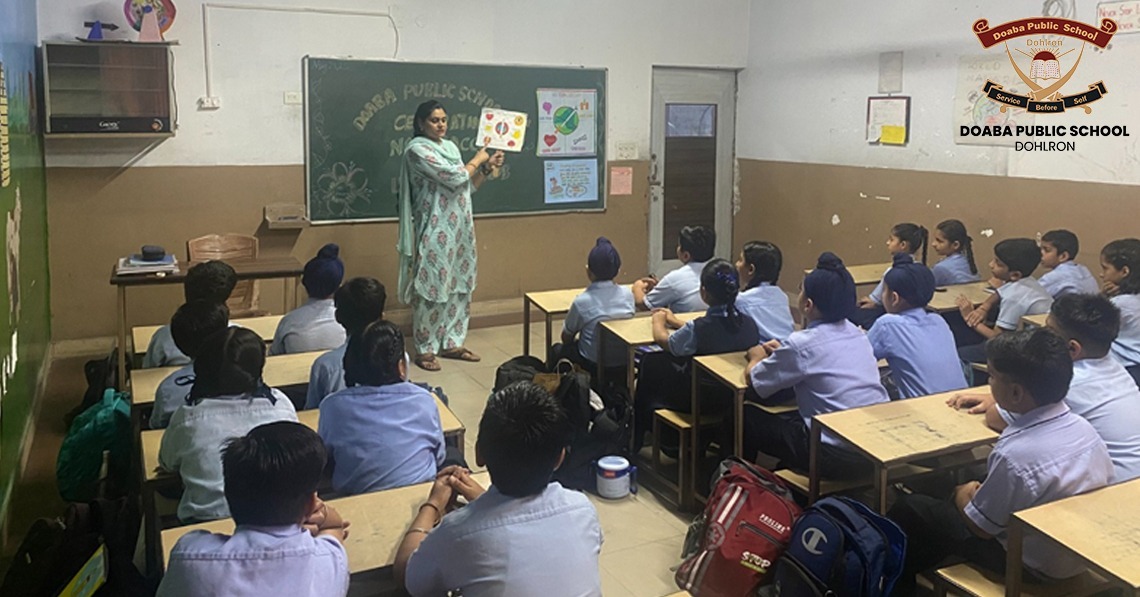
14 Oct The Psychology of Mindful Brains
Shaping calm, focused, and resilient learners at Doaba Public School, Dohlron
A World That Moves Too Fast
Children today live in a world that rarely pauses. From the buzz of notifications to the constant rush of academics and activities, their minds are pulled in a dozen directions at once. Amid this pace, the question arises—how can young learners truly focus, absorb deeply, and grow into balanced individuals?
The answer lies in cultivating a mindful brain.
At Doaba Public School, Dohlron, the Best School in Mahilpur, we believe that education must go beyond knowledge delivery. It must also guide students to train their minds—teaching them to slow down, to notice, and to direct their attention with purpose.
The Science Behind Mindful Brains
Modern neuroscience and psychology provide compelling evidence for the benefits of mindfulness:
- Enhanced Attention and Concentration
Mindfulness strengthens the prefrontal cortex, the part of the brain responsible for focus, decision-making, and self-control. Students who practice mindful awareness demonstrate longer attention spans, improved task completion, and reduced distractions. - Improved Memory and Learning
Mindfulness stimulates the hippocampus, enhancing the brain’s ability to encode and retrieve information. Children with mindful habits are better at understanding complex concepts and recalling lessons with clarity. - Emotional Regulation
By calming the amygdala, the brain’s stress center, mindfulness reduces anxiety, fear, and emotional reactivity. Students can approach challenges with a balanced, composed mindset, even under pressure. - Resilience and Adaptability
Mindful children develop psychological flexibility, allowing them to respond effectively to change, setbacks, or unexpected situations. This resilience is a key predictor of success in school and life. - Social and Emotional Intelligence
Mindfulness enhances empathy, patience, and interpersonal skills. Students learn to listen actively, communicate respectfully, and build stronger relationships with peers and teachers.
In simple words, mindfulness helps children learn not only faster but also better and deeper.
The Doaba Way of Nurturing Mindful Brains
At our school, mindfulness is not treated as a subject, but as a culture woven into daily life.
- A calm start to the day: Each morning begins with a mindful assembly, where students engage in short breathing exercises, gratitude reflections, and quiet moments to set a positive tone for the day. This shared, peaceful start helps students enter the learning environment with focus, calmness, and readiness to absorb new knowledge.
- Mindful classrooms: Teachers integrate short pauses—moments of silence, reflection, or simple stretches—that allow students to reset their focus before moving forward.
- Learning with awareness: Whether it’s pausing after a math solution or reflecting after reading a story, students are encouraged to notice their thoughts and feelings before rushing to the next task.
- Exams with ease: Before major assessments, students are guided through relaxation techniques to replace fear with confidence.
This approach ensures that mindfulness is not an extra task, but a natural rhythm of learning.
Beyond Academics: The Real Impact
The difference is visible. Classrooms feel calmer. Students participate with greater confidence. Stress levels, especially during exams, have lowered. Teachers notice that children are not just memorising but understanding more deeply.
More importantly, these mindful practices extend beyond school walls. Parents share stories of children handling conflicts with more patience, expressing gratitude more often, and even guiding siblings into calming routines.
A Shared Responsibility
Mindfulness is most powerful when practiced together—by students, teachers, and parents. At Doaba Public School, we encourage families to bring small mindful rituals into their homes:
- Short screen-free breaks.
- Evening gratitude circles.
- Calm breathing before starting homework.
When school and home align, children grow up seeing mindfulness not as an activity, but as a way of living.
Looking Ahead
The psychology of mindful brains teaches us something profound: academic success is only complete when balanced with emotional intelligence and inner calm. In a world full of distractions, children who learn mindfulness early gain an advantage that lasts a lifetime.
At Doaba Public School, Dohlron, a CBSE-affiliated school in Mahilpur, our vision is clear—we are not just teaching for grades, but for growth. By nurturing mindful brains, we are preparing a generation that can think deeply, adapt wisely, and live meaningfully.
Because the strongest mind is not the busiest one—it is the mindful one.

Sorry, the comment form is closed at this time.